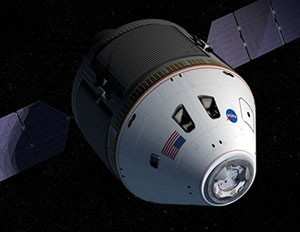Human Space Flight Commission Report Calls Current Situation An
"Unsustainable Trajectory"
 The Augustine Commission Report has concluded that to return
to the moon, NASA's budget would have to increase by $3 billion per
year over the currently budgeted $18 billion. Panel member Edward
Crawley, a professor of aeronautics at MIT, told the Associated
Press "Under the budget that was proposed, exploration beyond Earth
is not viable."
The Augustine Commission Report has concluded that to return
to the moon, NASA's budget would have to increase by $3 billion per
year over the currently budgeted $18 billion. Panel member Edward
Crawley, a professor of aeronautics at MIT, told the Associated
Press "Under the budget that was proposed, exploration beyond Earth
is not viable."
That leaves the Obama administration with essentially two
options, according to former NASA Administrator and commission
member Alan Stern. Obama faces a choice of "essentially abandoning
human spaceflight" or paying the extra money, he told the news
service.
The summary report, which was posted Tuesday on the NASA and
White House websites, says the committee identified a number of
alternatives for the Human Spaceflight Program. It found:
Human exploration beyond low-Earth orbit is not viable under the FY
2010 budget guideline.
Meaningful human exploration is possible under a less constrained
budget, ramping to approximately $3 billion per year above the FY
2010 guidance in total resources.
Funding at the increased level would allow either an exploration
program to explore Moon First or one that follows a Flexible Path
of exploration. Either could produce results in a reasonable
timeframe.
The report makes a case for extending the life of the shuttle
program. "Although a thorough analysis of Shuttle safety was not
part of its charter, the Committee did examine the Shuttle’s
safety record and reliability. New human-rated launch vehicles will
likely be more reliable once they reach maturity, but in the
meantime, the Shuttle is in the enviable position of being through
its infant mortality phase. Its flight experience and
demonstrated reliability should not be discounted.
Once the Shuttle is retired, there will be a gap in
America’s capability to launch humans into space. That gap
will extend until the next U.S. human-rated launch system becomes
available. The Committee estimates that, under the current plan,
this gap will be at least seven years long. There has not been this
long a gap in U.S. human launch capability since the U.S. human
space program began," the report says.
Not to mention, the report says later, that the ISS is scheduled
to be retired before the next U.S. human launch vehicle is now
expected to be ready, leaving the Orion as a spacecraft with no
place to go.

Orion Spacecraft Artist's
Rendering
The report does indicate that commercial space ventures can play
a key role in reducing the costs of human space flight. "It seems
improbable that significant reductions in launch costs will be
realized in the short term until launch rates increase
substantially—perhaps through expanded commercial activity in
space," the report says, and then mentions the possibility of
guaranteed contracts for space companies much like the Air Mail
service helped foster the growth of commercial airlines. "The
Committee concludes that an architecture for exploration employing
a similar policy of guaranteed contracts has the potential to
stimulate a vigorous and competitive commercial space industry.
Such commercial ventures could include supply of cargo to the ISS
(already underway), transport of crew to orbit and transport of
fuel to orbit. Establishing these commercial opportunities could
increase launch volume and potentially lower costs to NASA and all
other launch-services customers."
The report lays out the different scenarios for exploration
beyond low earth orbit, including Moon First, Mars First, and a
"Flexible Option." But funding is the key factor in all of these
options, and while "The Committee has found two executable options
that comply with the FY 2010 budget ... neither allows for a viable
exploration program. In fact, the Committee finds that no plan
compatible with the FY 2010 budget profile permits human
exploration to continue in any meaningful way."
Which puts the U.S. Manned Space Program on what the report
calls in its opening sentence an "unsustainable trajectory."
 Airbus Racer Helicopter Demonstrator First Flight Part of Clean Sky 2 Initiative
Airbus Racer Helicopter Demonstrator First Flight Part of Clean Sky 2 Initiative Diamond's Electric DA40 Finds Fans at Dübendorf
Diamond's Electric DA40 Finds Fans at Dübendorf ANN's Daily Aero-Term (04.23.24): Line Up And Wait (LUAW)
ANN's Daily Aero-Term (04.23.24): Line Up And Wait (LUAW) NTSB Final Report: Extra Flugzeugbau GMBH EA300/L
NTSB Final Report: Extra Flugzeugbau GMBH EA300/L Classic Aero-TV: 'Never Give Up' - Advice From Two of FedEx's Female Captains
Classic Aero-TV: 'Never Give Up' - Advice From Two of FedEx's Female Captains




